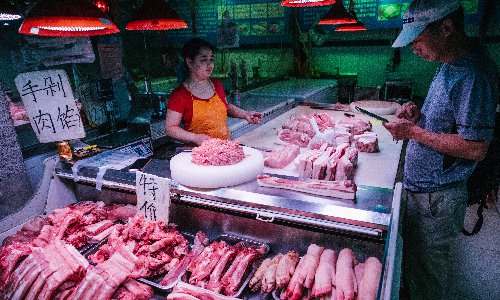HOME >> BUSINESS
China's consumer inflation surges to 7-year high as meat prices soar
Source:Global Times Published: 2019/11/9 12:35:13 Last Updated: 2019/11/10 8:17:05

Photo: Li Hao/GT
China's consumer inflation hit a fresh high in more than seven years in October amid skyrocketing pork prices, official data showed on Saturday.
The consumer price index (CPI), a main gauge of inflation, rose 3.8 percent year-on-year in October, the highest level since January 2012, or a fresh high in the past 93 months, the National Bureau of Statistics (NBS) said. The index edged up 0.9 percent on a monthly basis.
Most notably, pork prices were up 101.3 percent year-on-year last month, pushing up the consumer inflation by 2.43 percentage points. Livestock meat prices as a whole surged 66.8 percent year-on-year, contributing 2.92 percentage points to the October CPI rise.
The rise in CPI will complicate Chinese central bank's monetary policy as any fresh cuts in the benchmark interest rates to fire up the slowing economy is made more difficult, market watchers say.
Pork prices-fueled consumer inflation accounts for nearly two-thirds of October's CPI growth year-on-year, Shen Yun, a senior statistician at the NBS, explained in a statement posted on the bureau's website on Saturday. As measured monthly, the rise was more striking - pork prices soared 20.1 percent in October over September, contributing nearly 90 percent of the index's gain over the past month, Shen said.
The producer price index went up 0.1 percent in October from September, but on a yearly basis, the producer inflation contracted 1.6 percent last month.
Pork inflation has made headlines throughout the year as China continues to fight African Swine Fever (ASF).
As part of the effort to fill the supply gap and arrest the runaway prices, the country has ramped up imports of pork and its substitutes such as beef and poultry.
Chinese imports of pork and related products are forecast to exceed 3 million tons in 2019 and are set to continue to rise in 2020, Wang Bin, deputy chief for market operations at the Ministry of Commerce, said in Shanghai on Thursday at a meat conference, Chinese news site 21jingji.com reported.
The country's imports of pork substitutes, beef, and poultry included, will also reach 2.7 million tons this year.
In the first three quarters of the year, domestic pork production shrank 17.2 percent year-on-year to 31.81 million tons, Wang said, adding that domestic consumption of pork fell 20 to 30 percent due to soaring prices.
The upward spiral in consumer inflation seems to have strengthened the case for monetary tightening moves in theoretical terms, but a slowing economy which expanded by 6.0 percent in the third quarter, the weakest pace in nearly three decades, and the US Federal Reserve's continuing rate cut moves, have seemingly indicated a different approach, analyst said.
The People's Bank of China (PBC), the central bank, on Tuesday, lowered the interest rate on its one-year medium-term lending facility loans by 5 basis points to 3.25 percent.
The loan rate cut move, the first since 2016, is believed to pave the way for a cut in the new benchmark Loan Prime Rate which is announced on the 20th of every month.
RELATED ARTICLES:
Posted in: ECONOMY